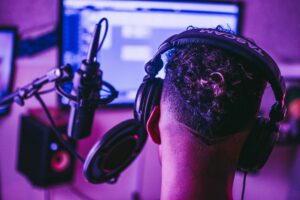I recently watched the new Lewis Capaldi documentary on Netflix and I must say, it was definitely an eye-opener. If you haven’t yet watched it, although a heavy watch, I would highly recommend it. Some of the topics covered in the programme on the chart-topping singer-songwriter’s life included songwriting, mental health, grief, suicide and Tourette’s syndrome, of which Capaldi was only diagnosed fairly recently, in September 2022.
During 2022, Capaldi was forced to take some time off due to his health, during which time he was diagnosed with Tourette’s syndrome and the Glaswegian has recently stated that he may be forced to quit music entirely as the job exacerbates his symptoms. Many music artists we follow suffer from disabilities and health issues without us even knowing. So, how seriously is artists’ health being considered in the music industry? What measures and support are in place for artists with health issues or disabilities and what might this look like in the future?
The reality of being a musician with health issues and disabilities
In Capaldi’s recent documentary, he describes sitting at the piano whilst trying to write his second album and being in such crippling back pain. With his base level anxiety soaring his pain levels and tics worsened. He then had to take a break from work altogether. The pressure off the back of his debut album also led Capaldi to experience “frightful” panic attacks. A very lonely, scary experience that people may describe it as a sensation of ‘feeling like they are dying’.
There is a great misconception surrounding Tourette’s syndrome, which Capaldi suffers with and symptoms can vary from person to person – the condition can show in terms of physical symptoms and verbal tics such as shoulder shrugging, twitches and coughing. Lewis said after the success of his first album: “As soon as the first album does well, it’s like can he do it again though?”
“As soon as the first album does well, it’s like can he do it again though?”
– Lewis Capaldi
Another artist who has been vocal about her health struggles is Selena Gomez, who was diagnosed with bipolar disorder and lupus. Undergoing a mental breakdown during her 2016 tour led her to cancel the rest of the tour.
Selena suffers from the autoimmune disease Lupus and had another breakdown in 2018 after her white cell count dropped due to complications from the illness. She was rushed to a hospital and was then admitted into a psychiatric facility in which she had dialectical behaviour therapy (DBT) which focuses on behavioural patterns, healthy communication, mindfulness, emotional regulation and how to respond to negative events in a better way.
Whilst we have this perception that artists are indestructible, touring weeks and months on end – this is often not a reality. It is clear that some artists have to cope with serious health issues along with the added pressures of working in that type of job, making day-to-day life much more challenging.
With the nature of the busy, high-pressure role of a music artist, there is something to be said about the way that musicians can be supported during these stressful moments to help them cope more easily mentally and physically. Of course, with an underlying disability or health condition this makes life much more difficult, especially during more stressful periods. It’s important to note that The Musicians Union (MU) supports disabled musicians with a reduced membership rate. Things that the MU can help with include well-being services, healthcare, insurance, legal support, representation and recognition.
Why are musicians more likely to suffer from ill health?
The lifestyle of working as a musician can have a gruelling effect on physical and mental health. This includes irregular working patterns, stage fright, sexual harassment, poor health whilst touring such as a bad diet, no time for exercise or self-care, not sleeping well and an intense schedule whilst constantly being on a deadline to make it to the next show. This can cause health problems already present to become exacerbated such as in Capaldi’s or Gomez’s cases.
Whilst some labels may offer health care support, the pressure of signing to a label can be daunting for artists and knowing there will be support in place for their health whether it be an underlying condition or a more current issue relating to working in the industry, I believe labels and management companies should hire or have access to healthcare professionals who should be a critical part of the artist team, alongside the manager, promoter etc.
Iggy Azalea for example said that record labels should hire psychologists for the sake of the mental health of artists to help deal with pressure. “I really wish record labels would all agree to make it mandatory to hire at least one psychologist per label. Almost every artist in recent times has expressed struggling with the level of hate & pressure. Sports teams do it for their athletes, why not music labels?” the rapper tweeted.
What more needs to be done for the safety of musicians?
We are still hearing about artists suffering from their health and talks of some stopping the job altogether, with the ever growing pressure on artists today. There is support for musicians out there (free 24/7 helpline contact number: 0808 802 8008) but more needs to be done in terms of the infrastructure within the industry to normalise health support for artists.
Whether it be artists having to take a test to check their health status before touring or making it compulsory for labels and management companies to hire a health professional, a change in the infrastructure of the industry needs to take place. This will ultimately make artists happier in the job and their careers more sustainable in the long run. A small cost for labels and management, providing a much more long term benefit for everyone involved which could potentially save an artist’s life.



